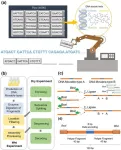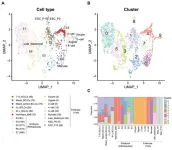(Press-News.org)
An international research team led by scientists in the Center for Genetic Epidemiology at the Keck School of Medicine of USC and USC Norris Comprehensive Cancer Center has singled out mutations in 11 genes that are associated with aggressive forms of prostate cancer. These findings come from the largest-scale prostate cancer study ever exploring the exome — that is, the key sections of the genetic code that contain the instructions to make proteins. The scientists analyzed samples from about 17,500 prostate cancer patients.
Today, oncologists customize care for certain individuals with aggressive prostate cancer with help from genetic tests. The results can inform treatment, as one class of targeted therapies has proved effective against some inherited prostate cancers. Test findings also can lead to genetic screening among patients’ family members, so they have the chance to take measures that reduce risk and to work with their doctors to be more vigilant in early detection.
The study, published in JAMA Oncology, uncovered mutations associated with higher risk for more-aggressive, deadlier prostate cancer that are not currently included on genetic test panels. The researchers also found some genes that are currently part of such panels are not linked with risk for aggressive disease.
“Very large studies are needed to inform the creation of gene panels used for testing,” said corresponding author Christopher Haiman, ScD, holder of the AFLAC Chair in Cancer Research and professor of Population and Public Health Sciences at the Keck School of Medicine. “Some of the genes in these panels were based on small studies and were not associated with prostate cancer in our study. We also found evidence that other genes perhaps ought to be added. The results aren’t completely definitive, but it’s clear that more work needs to be done to determine which genes oncologists should focus on in testing.”
Exploring prostate cancer genes in 17,500 patients
Combining information from 18 studies conducted in the U.S., Europe and Australia, the research team analyzed blood samples from prostate cancer patients of European descent, 9,185 of whom had aggressive disease and 8,361 who did not and compared the frequency of mutations among the two groups.
In the first stage of their investigations, Haiman and his colleagues sequenced the entire set of protein-coding genes among almost a third of participants. In the second stage, the researchers used samples from the remaining participants to zoom in on a subset of 1,749 genes that either had previously been associated with cancer or showed up as likely candidates in the first phase.
That subset included almost 200 genes involved with DNA repair. When that process is disrupted, it creates an opportunity for cancerous cells to arise and take hold.
An opportunity to advance treatment and prevention
The eleven genes that emerged as having mutations significantly linked to aggressive prostate cancer include BRCA2, also known for its connection to breast cancer. The list of genes, as well as those currently screened in genetic tests found not to be linked serious disease, could influence individualized treatment for prostate cancer, as well as screening.
Haiman notes that mutations found in the study also showed up in some patients who didn’t have aggressive disease.
“This suggests that mutations in these people may put them at greater risk for their cancer later becoming more advanced,’” he said. “While screening is focused on men with advanced disease or a family history, finding patients with less advanced disease who carry these genetic variants may enable them to receive targeted forms of treatment earlier on.”
The study does come with two important caveats. One is that, despite its large size, some mutations that drive risk for aggressive prostate cancer are so rare that even bigger studies are needed to clear up the picture. The other limitation is that the findings may differ outside of the population under investigation, people of European descent.
“It will be important for similar efforts to take place in men of African ancestry,” said Haiman, who is also co-leader of the Cancer Epidemiology Program at USC Norris cancer center. “That’s very important. These genes and perhaps others may be important, so additional work needs to be done in other populations.”
About this study
The first author of the study is Burcu Darst, PhD, an assistant professor at Fred Hutchinson Cancer Center and former postdoctoral research associate at the Keck School. Other co-authors from the Keck School are Xin Sheng, MS; Peggy Wan, MA; Loreall Pooler, BS; Lucy Xia, MS; and David Conti, PhD, a professor of Population and Public Health Sciences. The more than two dozen other co-authors of the study comprise researchers from the Institute of Cancer Research, London; the National Cancer Institute; the American Cancer Society; the University of Cambridge, the University of Oxford and the Royal Marsden NHS Foundation Trust, all in the UK; University of Texas MD Anderson Cancer Center; the Mayo Clinic; the Karolinska Institute in Sweden; the Cancer Council Victoria, Monash University and the University of Melbourne, all in Australia; Dana-Farber Cancer Institute; Aarhus University in Denmark; Northwestern University; and Johns Hopkins University.
This study was supported by the National Institutes of Health (R01CA196931, R00CA246063) and the Andy Hill CARE Foundation.
END
Palaeontologists at University College Cork (UCC) in Ireland have discovered X-ray evidence of proteins in fossil feathers that sheds new light on feather evolution.
Previous studies suggested that ancient feathers had a different composition to the feathers of birds today. The new research, however, reveals that the protein composition of modern-day feathers was also present in the feathers of dinosaurs and early birds, confirming that the chemistry of feathers originated much earlier than previously thought.
The research, published today in Nature Ecology and Evolution, was led by palaeontologists ...
MicroRNAs are small molecules that regulate gene activity by binding to and destroying RNAs produced by the genes. More than 60% of all human genes are estimated to be regulated by microRNAs, therefore it is not surprising that these small molecules are involved in many biological processes including diseases such as cancer. To discover the function of a microRNA, it is necessary to find out exactly which RNAs are targeted by it. While such methods exist, they require a lot of material typically in order of millions of cells, to ...
A new form of agricultural pest control could one day take root—one that treats crop infestations deep under the ground in a targeted manner with less pesticide.
Engineers at the University of California San Diego have developed nanoparticles, fashioned from plant viruses, that can deliver pesticide molecules to soil depths that were previously unreachable. This advance could potentially help farmers effectively combat parasitic nematodes that plague the root zones of crops, all while minimizing costs, pesticide use and environmental toxicity.
Controlling infestations caused by root-damaging nematodes has long been a challenge in agriculture. One reason is that the types of pesticides ...
A research team led by Prof. LIN Nan from the Institute of Psychology of the Chinese Academy of Sciences found that during sentence processing, the neural activity of two canonical language areas, i.e., the left ventral temporoparietal junction (vTPJ) and the lateral anterior temporal lobe (lATL), is associated with social-semantic working memory rather than language processing per se.
The study was published in Nature Human Behaviour on Sept. 21.
Language and social cognition are two deeply interrelated abilities of the human species, but have traditionally been studied ...
On September 17th, 2023, Carbon Future, an international interdisciplinary journal sponsored by Tsinghua University, has been officially inaugurated.
Carbon Future is an open access, peer-reviewed and international interdisciplinary journal that reports carbon-related materials and processes, including carbon materials, catalysis, energy conversion and storage, as well as low carbon emission process and engineering. The journal is published quarterly by Tsinghua University Press, and publicly released on SciOpen, an internationally digital ...
In a groundbreaking study published in Engineering, researchers have developed a revolutionary method for data storage using DNA. The paper titled “Engineering DNA Materials for Sustainable Data Storage Using a DNA Movable-Type System” introduces a novel approach that utilizes DNA fragments, referred to as “DNA movable types,” for data writing, thereby eliminating the need for costly and environmentally hazardous DNA synthesis.
DNA molecules have long been recognized as green materials ...
Weill Cornell Medicine has received a three-year, nearly $6 million grant to lead one of three national contraceptive research centers. The grant from the Eunice Kennedy Shriver National Institute of Child Health and Human Development, part of the National Institutes of Health, will fund the Weill Cornell Medicine Contraception Development Research Center. Led by Drs. Jochen Buck and Lonny Levin, both professors of pharmacology at Weill Cornell Medicine, the center will focus on developing an on-demand male contraceptive.
“It’s an honor to be selected for a second time for this award,” Dr. Levin ...
INDIANAPOLIS -- Frailty is a serious concern in later-life adults due to its association with additional health risks including disability, falls, hospitalization and mortality. The prevalence of frailty has risen over time; about 15 percent of those aged 65 years and older are considered frail.
In one of the first studies to analyze the mediating effects of social relationships in the relationship between childhood experiences and frailty, Regenstrief Research Scientist Monica M. Williams-Farrelly, PhD, has found ...
The onset of embryo-specific gene transcription, also known as embryonic genome activation (EGA), is a crucial step in the developmental journey of an organism. Although EGA has been studied to some extent in mice, human EGA remains largely unexplored, mainly due to the lack of novel in vitro cell models and ethical restrictions on the usage of human embryos. Thus, cell models resembling the human blastomere stage—when the embryo undergoes a cell duplication process—are necessary to study the earliest stages of human EGA and understand the events that occur during early embryonic development.
To ...
Water is one of the most abundant substances on Earth and partakes in countless biological, chemical, and ecological processes. Thus, understanding its behavior and properties is essential in a wide variety of scientific and applied fields. To do so, researchers have developed various water models to reproduce the behavior of bulk water in molecular simulations. While these simulations can provide valuable insights into the specific properties of water, selecting an appropriate model for the system under study is crucial. ...




